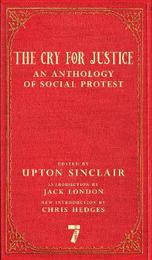
|
The Cry For Justice: An Anthology of Social Protest
Paperback / softback
Main Details
| Title |
The Cry For Justice: An Anthology of Social Protest
|
| Authors and Contributors |
By (author) Upton Sinclair
|
|
Foreword by Jack London
|
| Physical Properties |
| Format:Paperback / softback | | Pages:908 | | Dimensions(mm): Height 204,Width 126 |
|
| ISBN/Barcode |
9781609808365
|
| Classifications | Dewey:306 |
|---|
| Audience | |
|---|
|
Publishing Details |
| Publisher |
Seven Stories Press,U.S.
|
| Imprint |
Seven Stories Press,U.S.
|
| Publication Date |
28 January 2020 |
| Publication Country |
United States
|
Description
The writings of philosophers, poets, novelists, social reformers, and others who have voiced the struggle against social injustice. Selected from twenty-five languages, covering a period of five thousand years This bold anthology of social protest art art and literature spans five thousand years and twenty-five languages and is the preeminent collection of progressive thought, literature, and art. This massive, stirring, and insightful collection includes literature of social protest, progressive and socialist philosophy, excerpts from novels, poems, speeches, muck raking journalism, and art all in the service of voicing the struggle against social injustice. In 1915, shortly after the runaway success of his famous muckraking novel about the Chicago slaughterhouse industry, The Jungle, Upton Sinclair took time out of his busy writing and political organizing life to collect and then edit into a single volume work by the artists, novelists, philosophers, poets, and journalist who had inspired his career. Eye witnesses to war and revolution, Christian heretics, saints, humanist philosophers, labor organizers, martyrs, feminists, socialists, satirists, and characters from Dickens and Shakespeare can all be found in The Cry for Justice. This nearly 1000 page book includes work by Upton Sinclair, Jack London, Euripides, Dante, Emile Zola, Leo Tolstoy, John Galsworthy, William Blake, John Keats, Edward Bellamy, Charles Dickens, G. K. Chesterton, Winston Churchill, H. G. Wells, Walt Whitman, Charlotte Perkins Gilman, Rabindranath Tagore, Mark Twain, Abraham Lincoln, and many, many others in the form of essays, stories, poems, tracts, jokes, protests, and first-person accounts. Together they highlight a long undying progressive socialist tradition that most recently surfaced in Bernie Sanders's 2016 presidential campaign. The Cry for Justice is not a history book, it's a book for inspiring a better future, as relevant today as when it was first published. H. G. Wells, a contributor, referred to The Cry for Justice as Sinclair's "Book of Life". Jack London's enthusiastic introduction, which he calls a "humanist Holy Book," ends with "To see gathered here together this great body of human beauty and fineness and nobleness is to realize what glorious humans have already existed, do exist, and will continue increasingly to exist until all the world beautiful be made over in their image. We know how gods are made. Comes now the time to make a world."
Author Biography
UPTON SINCLAIR was the leading socialist American writer of the 20th century, publishing nearly a hundred books before his death in 1968. His work includes dozens of historical novels, numerous non-fiction works of muckraking journalism, socialist political tracts, drama, poetry, and several volumes of autobiography. Sinclair was also a socialist political organizer and was nearly elected governor of California in 1934. His most famous novel, The Jungle, published in 1906, exposed the horrific conditions in the US meatpacking industry, and is still a best selling book today. Jack London called it "the Uncle Tom's Cabin of wage slavery." Sinclair won the 1943 Pulitzer Prize for fiction for Dragon's Teeth, a novel set during the Nazi takeover of Germany during the 1930s. Oil!, his Southern California political satire, was the inspiration for the 2007 film There Will Be Blood. Numerous other works by Sinclair were adapted for film, television, and the stage. Sinclair engaged with and supported progressive and socialist work of all kinds. He founded a utopian community, edited works by other progressive writers and artists, was arrested at numerous protests, and traveled and lectured widely in support of progressive causes. CHRIS HEDGES (Intro) is an American journalist and Presbyterian minister. He is best known as the author of War Is a Force That Gives Us Meaning, a finalist for the National Book Critics Circle Award. He was a foreign correspondent for nearly two decades, reporting for The New York Times, The Dallas Morning News, The Christian Science Monitor, and National Public Radio reporting from Latin American, the Middle East, Africa and the Balkans. He is a Senior Fellow at The Nation Institute and writes an online column for the web site Truthdig. He has taught at Columbia University, New York University, Princeton University and the University of Toronto.
|